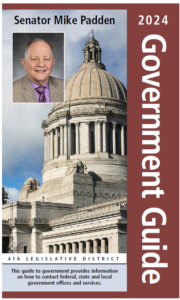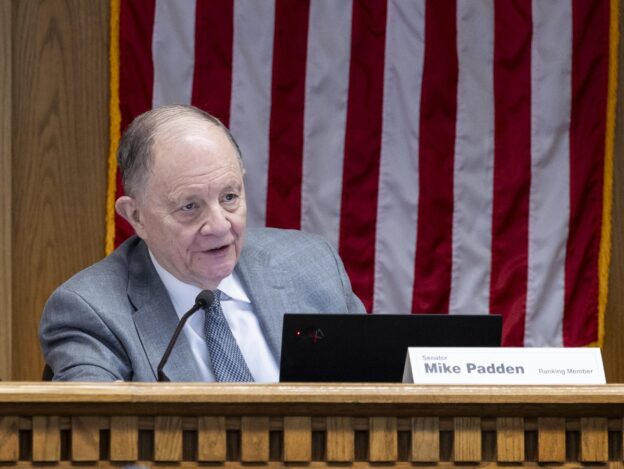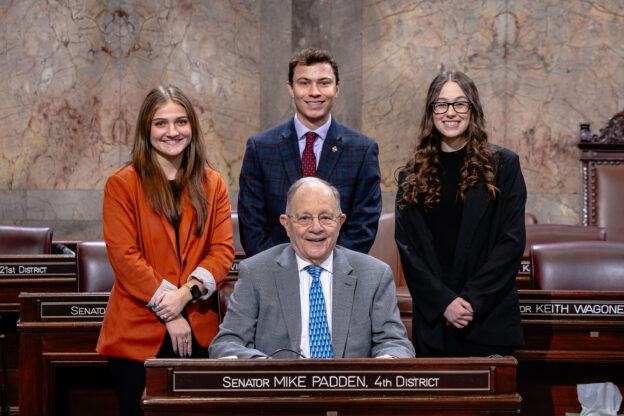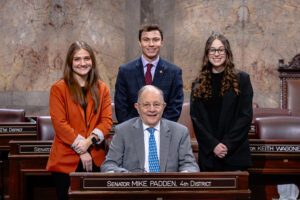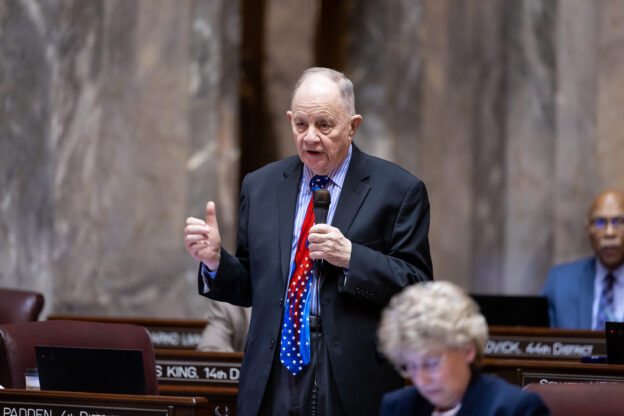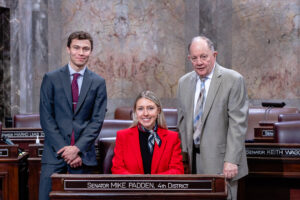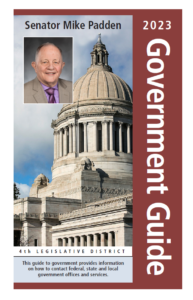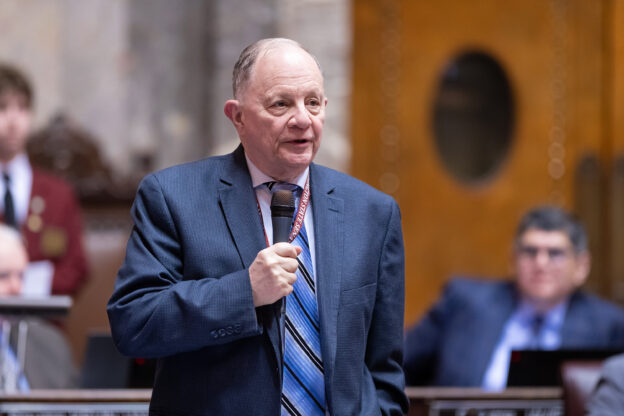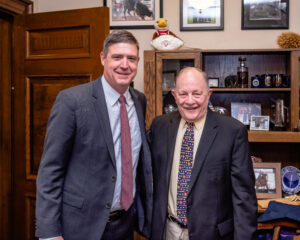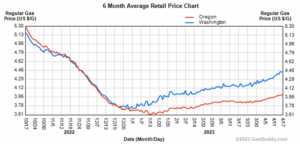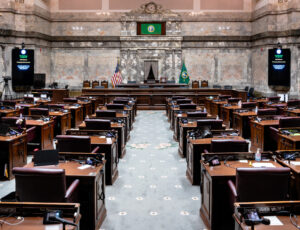Note: The following e-newsletter was sent to Sen. Padden’s subscribers March 27, 2024. To subscribe to Sen. Padden’s newsletter, click here.
Dear friends and neighbors,
You are invited to attend a town hall meeting on Tuesday, April 2 to discuss the recently ended 2024 legislative session. The meeting will be held from 6 p.m. to 7 p.m. in the Gerald A. Scheele Training Room at the Spokane Conservation District Building, 4422 E. 8th Ave. in Spokane Valley.
During the one-hour meeting, key issues from the session will be discussed and questions taken. I hope you can attend. If you have questions, please contact my legislative assistant, Annalise, by calling our district office at 509-921-2460.
If you have questions about how to participate in state government this year or thoughts to share on anything in this e-newsletter, please give me a call or send me an email.
Thank you, as always, for the honor of representing you in Olympia!
Best Regards,
Senator Mike Padden
Governor signs three Padden bills
In the nearly three weeks since the 2024 legislative session ended, Governor Inslee has been busy signing many bills passed by the Legislature. Three of them are measures that I introduced. More information about them is below. In addition, the governor is expected tomorrow to sign Senate Bill 5934, the pollinator habitat measure I sponsored at the suggestion of Girl Scout Julia Costello.
Senate Bill 5792
Senate Bill 5792, signed March 15, will exclude buildings with 12 or fewer units that are no more than three stories high from the definition of “multiunit residential building” if one story is utilized for above- or below-ground parking or retail space. This bill builds on last year’s successful measure to have more housing options for Washington’s middle class. Condominiums provide an affordable path to homeownership for first-time homebuyers.
During its public hearings this session, SB 5792 received positive testimony from Spokane Valley Mayor Pam Haley, Spokane Valley City Councilman Rod Higgins, Spokane City Council President Betsy Wilkerson and an official with the Building Industry Association of Washington.
The law created last year by Senate Bill 5058, which I also prime-sponsored, exempts buildings with 12 or fewer units that are no more than two stories high from the definition of “multiunit residential building.”
Washington has one of the lower homeownership rates in the nation, and both last year’s law and this year’s new law can help our state address this problem. These smaller condominiums will still have the same building requirements of a townhouse or single-family house.
Senate Bill 5840
Senate Bill 5840 will simplify the process of leasing property – a change requested by the Real Property section of the Washington State Bar Association to bring Washington in line with other states. Washington is the rare state that requires commercial leases with terms longer than a year to be acknowledged before a notary. Many legal documents do not need to be notarized. By eliminating the notary, these transactions will be a little easier. SB 5840 was signed March 13.
Senate Bill 5920
Senate Bill 5920 allows the state Department of Health to have more psychiatric beds in Washington. This proposal reinstates authority for DOH until 2028 to grant certificate-of-need exemptions related to increasing psychiatric-bed capacity by allowing additional psychiatric beds or construction of a new psychiatric hospital.
A couple of years ago, a company was deterred from building a psychiatric hospital in Spokane Valley due to the certificate-of-need process. It was built in California instead, which does not require a certificate of need. The federal government figured out long ago that certificates of need do not work; it repealed federal certificate-of-need requirements in 1987. The governor signed SB 5920 on March 18.
During the public hearings on SB 5920 this session, the Washington Policy Center’s Elizabeth Hovde testified in favor of the measure. “I’m thankful for this bill,” said Hovde. “It addresses a need for vulnerable people. Experts say a minimum of 50 public psychiatric beds are needed for every 100,000 people. Washington state fails to meet that standard by a longshot.” She added that the state had an average of 13.3 psychiatric beds per 100,000 people in 2023.
Governor signs impaired-driving bill that includes Padden policy
Yesterday the governor signed House Bill 1493, a measure to combat impaired driving that includes policy that I have proposed for several years. This new and overdue law is a major step toward making Washington roads and highways safer. It includes provisions that will keep more repeat impaired drivers off the road.
An amendment approved by the Legislature added language from Senate Bill 5032, a measure that I introduced that would expand the period for reviewing prior convictions of impaired driving to 15 years, from the 10 years now in state law, when determining whether a new offense of impaired driving is charged as a felony.
The policy language from SB 5032 kept in HB 1493 will increase the penalty to a felony offense, rather than a gross misdemeanor, for any person who has three or more prior DUI offenses within that “lookback” period.
Adding the ‘lookback’ language to the new law will help keep additional repeat impaired-driving offenders off the roads. Washington has seen a significant increase in traffic deaths over the past few years. Drunken driving and drug-impaired driving, especially by repeat offenders, are two leading causes. The law created by House Bill 1493 will help remove the most dangerous drivers from our roads and highways and get them into treatment or they will be held accountable by the state criminal justice system. This bill provides balance, as it is strong on treatment while also being strong on accountability.
Many traffic fatalities in the state involve drivers who have had as many as eight DUI offenses, but the current 10-year lookback period is not long enough to allow the state to impose stronger punishment against such offenders.
Repeat impaired-driving offenders commit most of the vehicular homicides and vehicular assaults in Washington. We now have a new law to prevent those horrible and senseless crimes.
According to a recent Seattle Times story, the Washington Traffic Safety Commission predicts 2023 will surpass 800 traffic fatalities, the most the state has seen since 1990.
WTSC data shows there were 740 traffic deaths in the state in 2022 (the highest in over 30 years), including 389 fatalities involving drug- or alcohol-impaired driving. There were 674 traffic deaths in 2021, including 345 fatalities involving impaired driving. In 2020, Washington had 574 traffic fatalities, including 282 involving impaired driving.
King County Senior Deputy Prosecutor Amy Freedheim testified in favor of HB 1493 last year. “We are a facing a crisis in traffic safety. Fatalities are at numbers we have not seen in over two decades, and over 60 percent of them involve impairment. This bill closes many of the loopholes,” Freedheim said during her testimony.
Report: WA has highest burglary rate of any state
Our state’s bad reputation for crime gets worse. It’s bad enough that Washington ranks first nationally for auto thefts. But according to a story published two weeks ago, an analysis of FBI crime data by a Arizona-based law firm shows Washington has the highest burglary rate of any state in America. The analysis revealed our state had 548.4 burglaries per 100,000 residents, more than twice the national rate of 254.3.
The Legislature’s approval this session of Initiative 2113, which fully restores law enforcement’s ability to pursue suspects, should help reduce burglaries and other crimes, although our state’s lowest-in-the-nation number of law enforcement officers per capita makes it hard for law enforcement to get the upper hand in its ongoing battle with criminals. I-2113 takes effect June 6 this year.
West Valley High School teacher honored
Like some of you, I read the Spokesman-Review article last week about a West Valley High School teacher and adviser, Shanté Payne, who recently received an award: high school adviser of the year from the Northeast region of the Association of Washington Student Leaders. It’s always good to see local teachers and other educators being recognized for their good work. Congratulations to Shanté on this honor.
New government guide available
With the election of many new officeholders in various local government positions, there is a new 4th District Government Guide for districts residents to use. It includes names and contact information for officials at the federal, statewide, legislative and local government levels. It also provides other helpful information. If you would like to have a copy of the new government guide mailed to you, please contact my legislative assistant, Annalise Hemingway, at annalise.hemingway@leg.wa.gov or call her at our district office at 509-921-2460.
Copies of the updated government guide also will be available soon at these locations:
- Millwood City Hall (9103 E Frederick Ave., Spokane)
- Argonne Library (4322 N Argonne Road, Spokane)
- Spokane Valley City Hall (10210 E Sprague Ave., Spokane Valley)
- Spokane Valley Library (12004 E Main Ave., Spokane Valley)
- Liberty Lake City Hall (22710 E Country Vista Drive, Liberty Lake)
- Liberty Lake Library (23123 E Mission Ave., Liberty Lake)
- Otis Orchards Library (22324 E Wellesley Ave., Otis Orchards)
- Spokane Valley Senior Center (2426 N Discovery Place, Spokane Valley)
Contact us!
If you have a question or concern about state government, please do not hesitate to contact our office. During the session we are conducting business from our Senate office in Olympia. We are here to serve you!
Phone: (360) 786-7606
Olympia Office: 215 Legislative Modular Building, Olympia, WA 98504-0404
Email address: Mike.Padden@leg.wa.gov
PLEASE NOTE: Any email or documents you provide to this office may be subject to disclosure under RCW 42.56. If you would prefer to communicate by phone, please contact Sen. Padden’s Olympia office at (360) 786-7606.
To request public records from Sen. Padden, please contact Randi Stratton, the designated public records officer for the Secretary of the Senate and Senate members.















